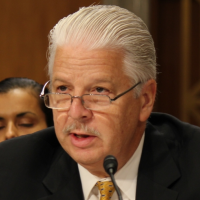Bipartisan Challenge to “Danger Pay” Denial for State Dept. Employees in Mexico
 Gregory Starr
Gregory Starr
The State Department has travel warnings in effect for much of Mexico, warning travelers which areas are relatively safe and to which “non-essential travel should be deferred.” Despite those warnings, the department has notified many of its personnel in Mexico that their danger pay will soon be terminated. Congress members from both parties are upset about the move.
The Foreign Service pays diplomats in some areas bonuses up to 35% of their base pay if they’re posted in areas the State Department deems dangerous. Countries such as Saudi Arabia, Israel, Pakistan and others are on the list of countries deemed dangerous enough to earn the bonuses.
The State Department says that even though personnel are warned to stay off the streets in certain border areas, they can “walk across the border and be in a Walmart or a Dairy Queen,” Gregory Starr, State’s assistant secretary at the Bureau of Diplomatic Security, said Wednesday at a hearing, according to Government Executive.
“Shame on you for saying that,” House Oversight and Government Reform Committee chairman Jason Chaffetz (R-Utah) said in response to Starr’s remark. “It’s so dangerous they can’t even go outside.” Earlier this year, a Border Patrol helicopter was brought down in Texas by gunfire coming from the Mexican side of the border.
Of the 2,800 State Department employees posted in Mexico, a “minimal” number are involved in areas where there is crime, claimed the department’s deputy assistant secretary for Western Hemisphere Affairs, Sue Saarnio. “We think it’s manageable,” she said, conceding that some State employees are advised to stay off the streets at night.
The move to cut danger pay comes from a unit within the State Department called the Danger Pay Working Group, which determined that the current approach to awarding Danger Pay has “veered from the original legislative language.” That language is very narrow and specific, stating that such pay is warranted in circumstances involving “civil insurrection, civil war, terrorism or wartime conditions which threaten physical harm or imminent danger to the health or well-being of an employee.” The Working Group wants Danger Pay to be limited to the conditions cited in that federal statute, which would result in the loss of such compensation to numerous U.S. employees around the world.
Although it won’t make up for the significant paycheck cuts, the Working Group is considering shifting some of the broader Danger Pay conditions, now being abandoned, into the Hardship Differential Pay—a lesser bonus amount that tells employees their government may no longer believe they are in danger, but does acknowledge a certain hardship associated with their work.
Democratic Rep. Henry Cuellar of Texas wants to look further into the pay issue. “Congress will probably have a say on this,” Cuellar said. “Not that we want to micromanage, but appropriations should be involved.”
-Steve Straehley, Danny Biederman
To Learn More:
A Federal Employee Pay Cut Even Republicans Are Outraged About (by Eric Katz, Government Executive)
Two High Ranking Members of Congress Visit Laredo For Briefing About Helicopter Forced Down by Cartel Gunmen (by Alex Smith, Jammed Up)
Danger Danger, Bang Bang — State Department Eyes Changes in Danger Pay (by Domani Spero, Diplopundit)
- Top Stories
- Unusual News
- Where is the Money Going?
- Controversies
- U.S. and the World
- Appointments and Resignations
- Latest News
- Musk and Trump Fire Members of Congress
- Trump Calls for Violent Street Demonstrations Against Himself
- Trump Changes Name of Republican Party
- The 2024 Election By the Numbers
- Bashar al-Assad—The Fall of a Rabid AntiSemite






Comments